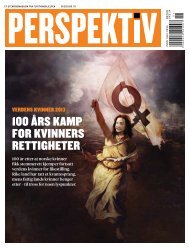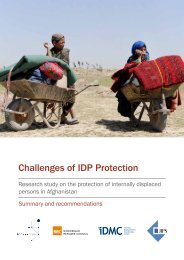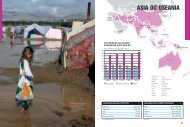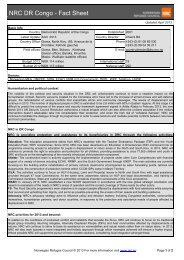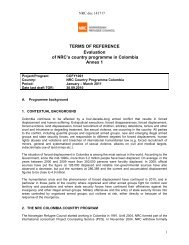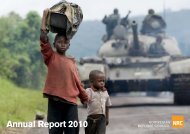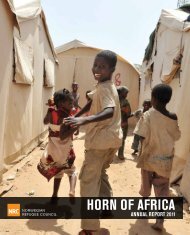NORWEGIAN REFUGEE COUNCIL - Flyktninghjelpen
NORWEGIAN REFUGEE COUNCIL - Flyktninghjelpen
NORWEGIAN REFUGEE COUNCIL - Flyktninghjelpen
Create successful ePaper yourself
Turn your PDF publications into a flip-book with our unique Google optimized e-Paper software.
<strong>NORWEGIAN</strong> <strong>REFUGEE</strong> <strong>COUNCIL</strong><br />
SHELTER<br />
POLICY
NOR WE G IA N R E FUG E E <strong>COUNCIL</strong><br />
G LOB A L M A ND A TE A ND P OLICY<br />
“The NRC shall promote and protect the rights of all<br />
people who have been forced to flee their countries,<br />
or their homes within their countries, regardless of<br />
their race, religion, nationality or political<br />
convictions. This will be achieved by acting as an<br />
independent and courageous spokesman for refugee<br />
rights nationally and internationally, by providing<br />
humanitarian assistance in emergency situations, and<br />
by strengthening the capacity of the UN organizations<br />
to offer and coordinate international aid and<br />
protection. The NRC shall in all ways seek to provide<br />
viable, durable solutions with regard to both its<br />
spokesman activities and its emergency relief<br />
efforts.” (NRC Statutes, Article 1)<br />
OBJECTIVES<br />
The objectives of NRC under the terms of this policy<br />
are to:<br />
provide emergency shelter in time to meet both<br />
immediate and temporary needs, in order to protect<br />
and save lives.<br />
facilitate durable solutions by supporting the<br />
(re)construction of permanent shelter.<br />
promote education through the provision of temporary<br />
and permanent school construction and rehabilitation.<br />
TARGET GROUPS<br />
Primary Shelter target groups are refugees, IDPs and<br />
returnees.<br />
Within the main target groups, priority will be given to<br />
vulnerable families or individuals selected according to<br />
internationally and locally recognised vulnerability<br />
criteria.<br />
NRC will strive support self-settled IDPs and refugees<br />
in both rural and urban settings.<br />
A secondary target group, the local host population,<br />
may be included when they live mixed with the primary<br />
target group and have similar shelter needs. However,<br />
the majority of the beneficiaries will be within the<br />
main target group<br />
PHASES<br />
In an emergency, shelter is often a key life-saving<br />
intervention. NRC will respond rapidly and<br />
appropriately with predefined capacity and inputs. It<br />
may also provide temporary structures to serve as<br />
schools.<br />
NRC will be prepared for long term assignments to<br />
facilitate durable solutions. As soon as conditions will<br />
allow, NRC will provide durable shelter, and school<br />
construction and rehabilitation, in the return and<br />
resettlement processes.<br />
Programmes will be planned and phased out in<br />
accordance with NRC Exit Strategies.<br />
APPROACH<br />
NRC will provide shelter that is of an appropriate<br />
standard, and is culturally and environmentally<br />
sensitive. More specifically, NRC will:<br />
provide solutions adapted to the specific context in<br />
both short and longer term emergency situations.<br />
in emergency interventions, strive to meet the Sphere<br />
Project ‘Minimum Standards in Humanitarian<br />
Response’ and the United Nations High<br />
Commissioner for Refugees (UNHCR) Handbook for<br />
Emergencies – as regards shelter solutions.<br />
support permanent housing in return or resettlement<br />
situations. Shelter for durable settlement will be<br />
moderate within the local context and cover the basic<br />
functions and standards needed to provide healthy,<br />
secure and dignified dwellings.<br />
ensure that the shelter components integrate into a<br />
sustainable living situation including basic<br />
infrastructure, especially through cooperation with<br />
other partners and service providers.<br />
ensure that shelter solutions consider and reflect the<br />
wider aspects of settlement conditions such as cultural<br />
and social aspects, climatic and environmental risks<br />
and security factors.<br />
integrate environmentally friendly materials and<br />
appropriate technology in solutions.<br />
NRC will strengthen local competence, capacity and<br />
self-reliance, by planning and implementing<br />
programmes so as to support the coping strategies and<br />
solutions of target groups, by:<br />
maximising the use of local labour, goods, materials<br />
and services.<br />
whenever applicable, designing programmes as selfhelp<br />
with mainly material and organisational or<br />
training support from NRC.<br />
1
where necessary including training for production of<br />
local building materials and helping initiate<br />
contracting enterprises.<br />
NRC shelter programmes will promote conflict<br />
resolution and prepare for long-term solutions, by:<br />
including long term perspectives even in emergency<br />
interventions and transitional settlement solutions.<br />
applying the Do No Harm approach.<br />
supporting community mobilization and community<br />
organisations in shelter provision.<br />
actively advocating for access to suitable buildings or<br />
land as a means of securing lasting solutions.<br />
securing that legal entitlements in ownership or<br />
tenure are formalised within the local legal<br />
framework.<br />
Beneficiary selection will be made in a transparent and<br />
participatory manner.<br />
NRC will support shelter activities globally by providing<br />
qualified shelter experts to the UN and other<br />
organisations.<br />
NRC will facilitate education by assisting with the<br />
construction/rehabilitation of schools as follows:<br />
Any such intervention will be planned in cooperation<br />
with any NRC education programmes in the area (see<br />
Education Policy).<br />
School construction may be included in both<br />
emergency and long-term operations, ranging from<br />
tents or temporary structures in camps to permanent<br />
schools in return or resettlement situations.<br />
Basic infrastructure such as access, and water and<br />
sanitation, will be secured by NRC, partners or local<br />
contributions.<br />
Schools for durable settlement will be of a moderate<br />
standard adapted to the general level of the country<br />
and cover primary needs for education activities, if<br />
possible complying with national standards.<br />
COORDINATION AND<br />
COOPERATION<br />
Coordination and cooperation with other NRC<br />
programmes will:<br />
be ensured at both HQ and field level, to share<br />
resources and mutually strengthen activities.<br />
in particular aim to integrate inputs from<br />
Information, Counselling and Legal Assistance<br />
(ICLA) programmes in shelter programmes (see<br />
ICLA Policy).<br />
coordinate emergency shelter under camp<br />
management (see Camp Management Policy).<br />
ensure that school construction is fully integrated with<br />
education projects (see Education Policy).<br />
NRC shelter capacity and implementation will be<br />
coordinated with the Emergency Shelter Cluster<br />
structure nationally and be in line with the guidelines<br />
applied by the Global Emergency Shelter Cluster.<br />
Other main stakeholders and cooperation partners for<br />
shelter projects will be:<br />
local and national authorities<br />
community groups, target group representatives,<br />
traditional structures<br />
UNHCR and other UN agencies<br />
international and local NGOs.<br />
2
LEGAL FRAMEWORK, POLICIES<br />
AND GUIDELINES<br />
Shelter activities will be based on and carried out<br />
within the framework of the following instruments and<br />
policies:<br />
Global<br />
The right to adequate shelter is stated in the<br />
International Covenant on Economic, Social and<br />
Cultural Rights (Article 11)<br />
United Nations Office for the Coordination of<br />
Humanitarian Affairs (OCHA) Guiding<br />
Principles on Internal Displacement<br />
Sphere Project Humanitarian Charter and<br />
Minimum Standards in Disaster Response<br />
NRC<br />
Policy Paper<br />
Protection Policy<br />
Evaluation Policy<br />
Code of Conduct<br />
Shelter Handbook<br />
Core Activity Policies<br />
Logistics Handbook<br />
3



